
Despite the recent setback to eMTB riders in Washington State a couple months ago, electric bike advocates appear to be making headway in other areas of mountain biking, and in surprising ways.
USFS allows e-bikes at Mammoth Mountain in California

Three years ago the USFS officially decided to manage e-bikes as motorized vehicles on Forest Service land, which effectively shut eMTBs out of some of the best trails in the country. However, the USFS recently decided to allow Class 1 e-bike usage at Mammoth Mountain in California on land the USFS leases to the resort.
[see_also id=’232262′]
Bike parks and ski areas like Mammoth Mountain have special-use permits to operate on USFS land, which allows them to develop ski runs and even install lifts and snow-making equipment. So while allowing e-bike usage at Mammoth Mountain, a relatively small area that’s already developed with manmade features, is not the same as allowing wider access to Forest Service managed land, it does appear to potentially open a door, albeit a tiny one.
Under this agreement, Mammoth Mountain becomes the first bike park on USFS land to allow e-bikes, though if things go well, it may not be the last. Electric mountain bikes still are not allowed on USFS trails connecting outside the park boundaries. It’s also important to note that only Class 1 e-bikes will be allowed, which is a more restrictive requirement than we’re seeing in other places like Colorado where Class 2 e-bikes are afforded the same access as Class 1 e-bikes.
eMTB access for the disabled

Griffin Bike Park in Indiana recently announced that Class 1 e-bikes would be allowed on trails within the park. The reason for the policy change? E-bikes can potentially help disabled trail users and riders recovering from injuries.
Since the beginning, advocates have argued that e-bikes can help the disabled, with some going so far as to suggest not allowing e-bikes could be a violation of the Americans with Disabilities Act (ADA). While we haven’t seen any e-bike bans being challenged along this front directly, some land managers appear to be getting out in front of the issue by preemptively allowing e-bike access to trails.
Built to honor the memory of Army Sergeant Dale Griffin, Griffin Bike Park hosts events honoring and benefiting veterans, including those who have been injured in combat. A local news report notes, “while [purists] may not like the idea of an e-Bike, it’s all about opening the trails to everyone.” While the trails are being opened to e-bikes largely to accommodate disabled or recovering riders, anyone can now ride an e-bike at Griffin Bike Park.
Griffin Bike Park manager Rich Moore says, “When you add batteries and motors it does add a significant amount of weight, but not enough to hurt the trails.”
States are passing their own laws
Earlier this year Singletracks covered e-bike laws affecting singletrack access in the states of Colorado and Washington. In Colorado, land managers seem split on whether the new law opens trails to eMTBs. In Washington, the law more clearly prohibits e-bike access on natural surface trails.
[see_also id=’232262′]
Is e-bike trail access a matter of two steps forward, one step back? We’ll continue to report on the issue as it progresses.












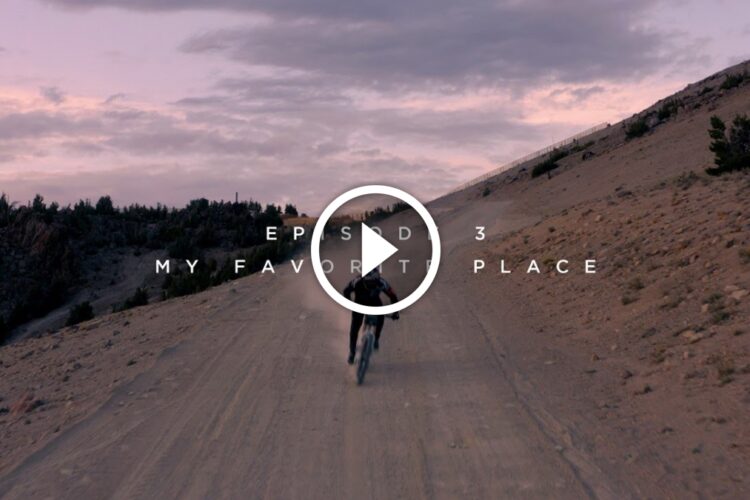

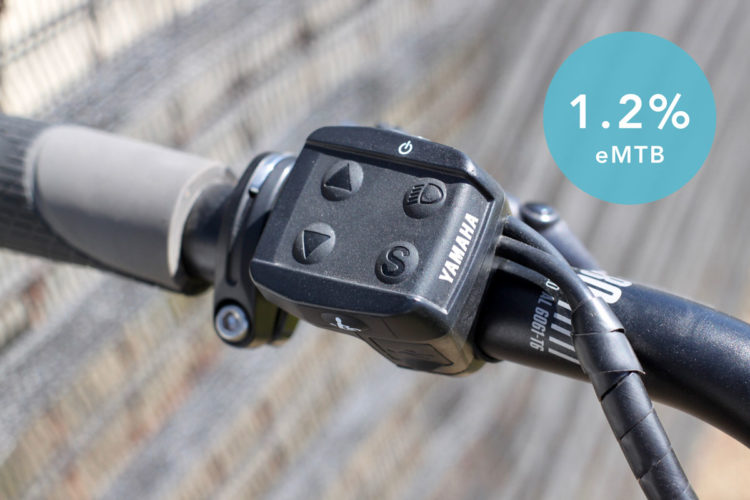

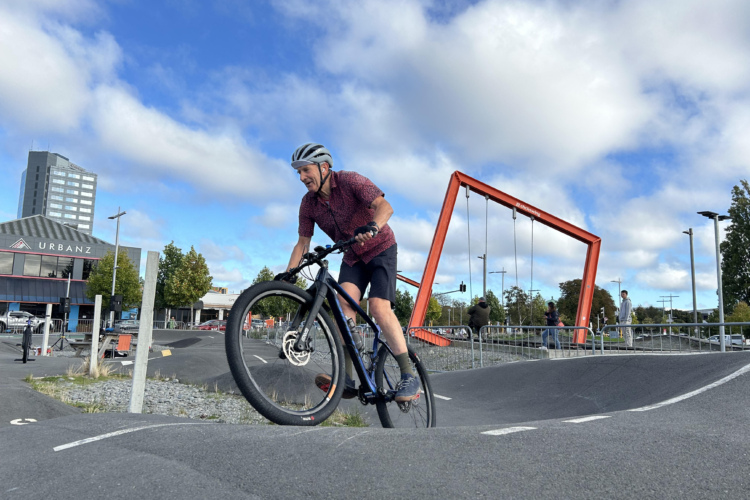
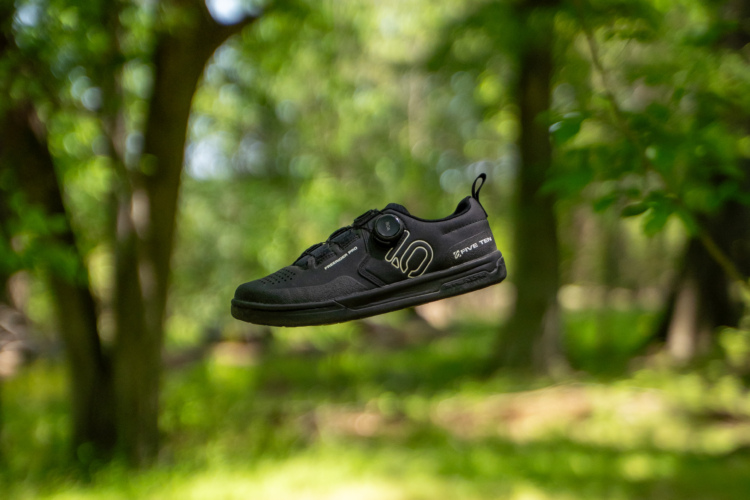

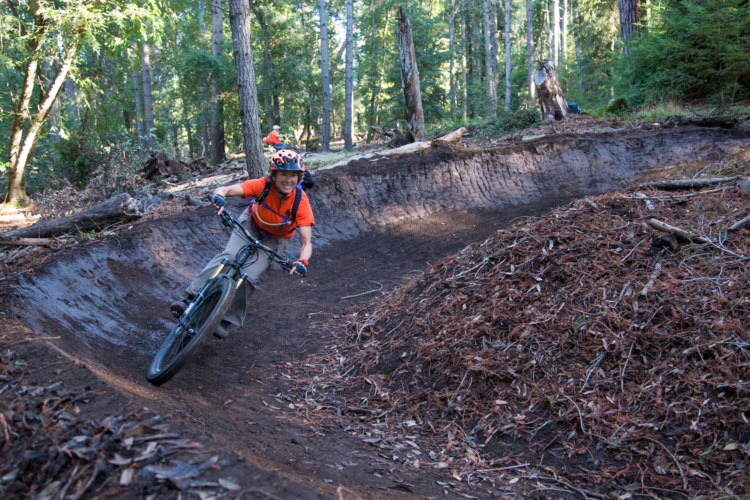

29 Comments
Jul 10, 2019
Jul 29, 2019
Class 1 ebikes cannot cause more trail damage, you can't peel out, you can only skid downhill, same as a pedal bike, which skid easier as they have less weight and less traction.
If you think it's more rewarding to work hard for your downhill, fine, but why force your opinions on others without merit?
How is it safer (for an ebiker) to be put on trails with vehicles that have 50 or 100 times more horsepower? If you are going to argue safety, then they should certainly stay on mtn bike trails vs motorized trails.
FYI, there are studies out that show hikers and other trail users who are adamantly against ebikes, but did not recognize that bikes riding past them were in fact ebikes, and they were not able to distinguish ebikes from mtn bikes.
I just picked up an ebike after not mountain biking much for the past 20 years due to the extreme amount of time and effort needed for a fun ride and partly due to health. I'm super psyched to be back out on a bike and still get a workout and have some fun.
People against class 1 ebikes, are frankly, selfish pricks....If I'm not affecting your experience, why do you care so much? I really don't get it.
I have run into 20 or 30 people on the trails (and on trails I thought I could ride), not a SINGLE person knew I was on an ebike, nor did they care when I don't them, NON of them knew I wasn't allowed on some trail (neither did I), so that is my only consolation that there is hope for humanity, as it confirms that there are actually a much smaller group pushing all this 'class 1 ebikes are the same as a motorized vehicle'...come on people!!
Oct 31, 2019
The Levo has 3 power settings
- level 1 10% boost
- level 2 25 % boost
- level 3 100% boost
At level 1, it basically offsets the weight of the bike and i average the same speed and calorie burn as my stumpy
At level 2, trail mode, i take advantage of easier climbs, but still have to work harder due to weight of bike to navigate rock climbs, i get more of a work out and calorie burn on the ebike
Level 3, only on road ways to and from trails. I’d challenge anyone to try to ride 20 miles per hour on single track without flying into trees through switchbacks or rockbeds....
People who consider ebikes a hazard are uninformed. if people think the e bike is a 20 mph motorcycle then you are a moron. Lets just ban any bike that can achieve a speed of 20 mph then. I’m sure many folks who drop 10K on an s-works full carbon bike to lessen weight to make them faster (cheaters) can easily achieve 20 mph downhill. Ban anyone who hits 20mph.
Is a bike that has 11 speeds cheating? It makes it easier then a single speed. Ban them.
The person who mentioned environmental concerns as a negative to ebikes......as you drive your f-150 to the trails...way to go champ...
I ride with some more advanced riders, they all ride faster then me on their standard bikes, when they need to pull over after a huge climb, i catch up. I dont need to break and we can then continue back down the hill, they get down much faster.
I can say from experience, I burn more calories, I cover more ground, I get out more often, and I have more fun then ever on my Levo.
If you can buy your 10k carbon fancy bike, dont be upset with me for choosing a 50lb aluminum bike with pedal assist, you could have done the same. lets all just enjoy the sport. For those who dont think ebike is a sport, you’ve never ridden one. In trail mode you get an extreme workout, you ride at the same speed as non ebike riders, you do nothing that damages the trails, and you have every right to be in the woods as the fancy carbon guys.
Just my opinions, as everyone here seems to have them. I am just coming from a position where I have boith bikes so my views are factual.
Jul 29, 2019
And one more legit question. I saw on trailforks some trails that went into wilderness boundries and the description said that you, 'must carry your bike through the wilderness section'...So I am assuming that I am totally within my rights to turn off my assistance, and downhill any trail that is open to mtn bikes, correct?
May 9, 2018
This will do nothing but make our sport even more popular.
Nov 3, 2018
May 12, 2018
May 11, 2018
May 9, 2018
It may make the "sport" stronger, but not the riders. The key word here is "sport". If you want a motorcycle, buy a motorcycle and stick to the dirtbike trails.
There should be a struggle in getting up that monster hill to bomb down the other side. You should have to build up the physical ability to get where you are going and back under your own steam. What happens when your battery craps out and you still have 5-miles of uphill to get back to the car?
May 10, 2018
Jun 29, 2018
Jul 4, 2019
A motorcycle flying down a trail and hitting an ebike doing 18 miles an hour would be bad, maybe they allow ebikes at motorcycle parks but I would not want to ride them.
As for riding a regular mtb I have not been on trails for years because I could not handle the uphills, I have a life besides riding a bike everyday to be in shape, lucky if I can ride once or twice per week.
Norco Sight VLT 2 class 1 ebike
May 29, 2019
I realize I'll never be able to ride at anywhere near the level I was capable of in the past but I need to keep riding to stay healthy, productive and sane. 10 years ago my current condition would have restricted me to bike paths and other flat environments(very rare in W PA); or become a walker and give up cycling all together- very depressing outcomes.
With E MTB's I have a shot at continuing in the sport I love and maybe even keeping up with my buddies or shortening their wait times for me to catch up. While my recovery continues I'm working on selling 3 of my "Acoustic bikes" and purchasing a cross country e mtb. I'll never ride on trails that restrict e bike use and I will respect all other trail users I encounter. I plan to enjoy trail riding as much as I can and keep chasing the exhilaration, endorphins and life long memories that have kept me passionate about MTB riding for over three decades.
So before you judge someone that rides an e-bike, consider the riders journey that led to his/her situation. We're not all rich and lazy, some of us have put our time in and find e bikes as the only option to continue riding at all.
What will your circumstances be in 10, 20, 30 years on?
Sep 10, 2019
I have been retired now for 6 years and am still mountain biking, thanks to the Ebike revolution. For the past 4 years, I have been converting almost any kind of non motorized bike, including full suspension MTB's like I ride to EBike status. Because there not many 80 year olds that mountain bike, I find that almost all of my riding buddies are many years younger and I would never be able to "keep up" if it were not for my ebike. By "keeping up", I do not mean speed. I am referring to strength and endurance. No matter how fit an 82 year old might be, I could never compete with the 50 and 60 year old riders that I play with. My Ebike levels the playing field. I can ride on the steeps. I can put on the miles, without exhaustion. There is no way in hell that being on an Ebike affords me the privilege of bombing down any trail any faster than an "acoustic bike". Safety first was my motto before the Ebike and it is no different now. I still have to pedal uphill. I still have to pedal on the flats. My heart rate goes up when I am riding. I still get a magnificent work out. It just happens at a reduced Vo2, and my friends do not have to wait much for me. If you are an Ebike hater, I suggest you ride one. It has changed my world. I suggest it might change yours also. Thanks for reading.
Jun 12, 2019
I'm a retired navy disabled veteran. My first real mountain bike I got in Nova Scotia was a Jeep rigid frame back in 92. Now I have a few hardtails, 2 squishes, and 2 ebikes. My current riding buddies are mountain goats. Climbing is very difficult due to disabilities, but I do have the skill for intermediate to some black diamond when it comes to downhill.
I look for riders coming up behind me. Sometime I don't see them until they are right behind me. Most every rider on the trail is very nice and politely ask if they can pass. I don't feel rushed nor feel like they should not pass? Its a trail we share, I am slower on the trail, so I pop off to the side quickly. They thank me and ride past. Later we may see each other in the staging area or local pub. It pays to be nice.
Today, even with my class one emtb I still have to work to get up a hill. There is no throttle on the bike so there are no roster tails of dirt flying or any trail digging with the rear knobby. The difference now is once I get to the top I'm not tossing up a lung. And the goats don't have to wait very long for me to catchup. We also do more miles.
May 15, 2018
My biggest concern is the ebike rider.
People can be jackasses on a regular mtb. An ebike allows jackassery to kick up a notch.
It'd be nice if someone needed a license to ride one...if just to try to curtail potential jackassery up front.
Hopefully, any folks riding them will be extra responsible and courteous about it.
Jul 30, 2019
May 12, 2018
The trail builders I ride with have no problems with them. I have friends partners are getting them to ride trails for the first time in years. People are being drawn into cycling on singletracks, this will become a wave of new users of the trail systems and will be difficult at first but it will increase access for everyone.
It's inevitable.
May 9, 2018
May 13, 2018
Aug 25, 2019
May 10, 2018
Ebikes intermingled with regular bikers wouldn't be smart, not only will it just pissoff both type of bikers (ebikes/non-ebikes) as one will want to pass by and the other won't want to be rushed. This might also be a liability concern to the parks as ebikes are motorized vehicles, this is why they are treated differently.
Solution, give them their own trails so they can ride till the cows come home, or their batteries die.
May 12, 2018
May 9, 2018
I also think the 8000$ full squish mountain bike crowd should realize that not everyone can afford a bike like that that will gobble up obstacles like a motocross bike.
I don’t see much of a difference between E bikes and these motocross bikes with no engine (making it too easy to go over obstacles).
How about that for a Segway ?
May 10, 2018
Aug 4, 2019
Also the bikes that are being allowed on trails called class 1 bike limited to 20 mph seem slow but on mountain bike trails 20 mph is way faster than most peoples top speed on the trails.
Just a bad idea in many ways.
Aug 6, 2019
Aug 5, 2019
May 14, 2018
Ebikes have nothing to do with the MTB sport. Ebikes are wonderful as transportation and as mention by Tinfang, help rangers tackle miles of off road carrying their gear for the public safety, but not to be allowed by any joe in trails used by regular bikes. Why do you think every state banned all two wheel hoverboards from being used in the same common areas as pedestrians, because it doesn't belong as it's a safety liability, same reason ebikes don't belong. There are plenty of motorbike trails in this country, go and shred those trails.